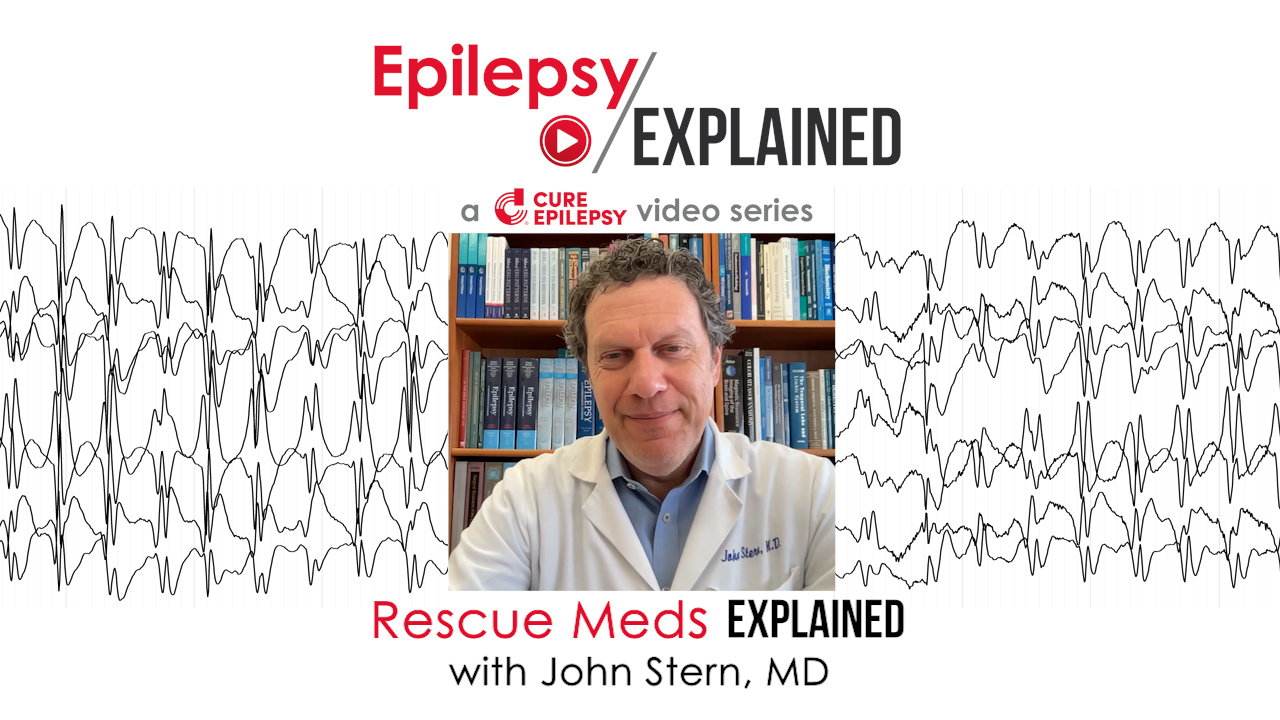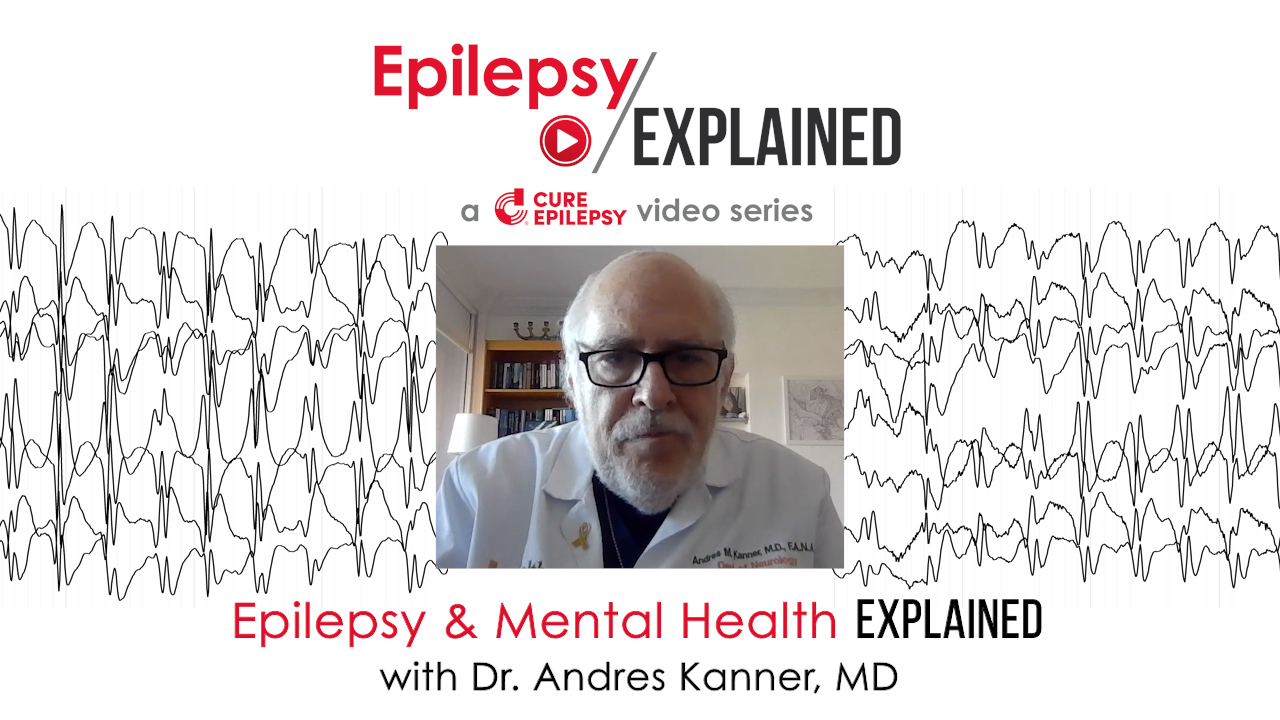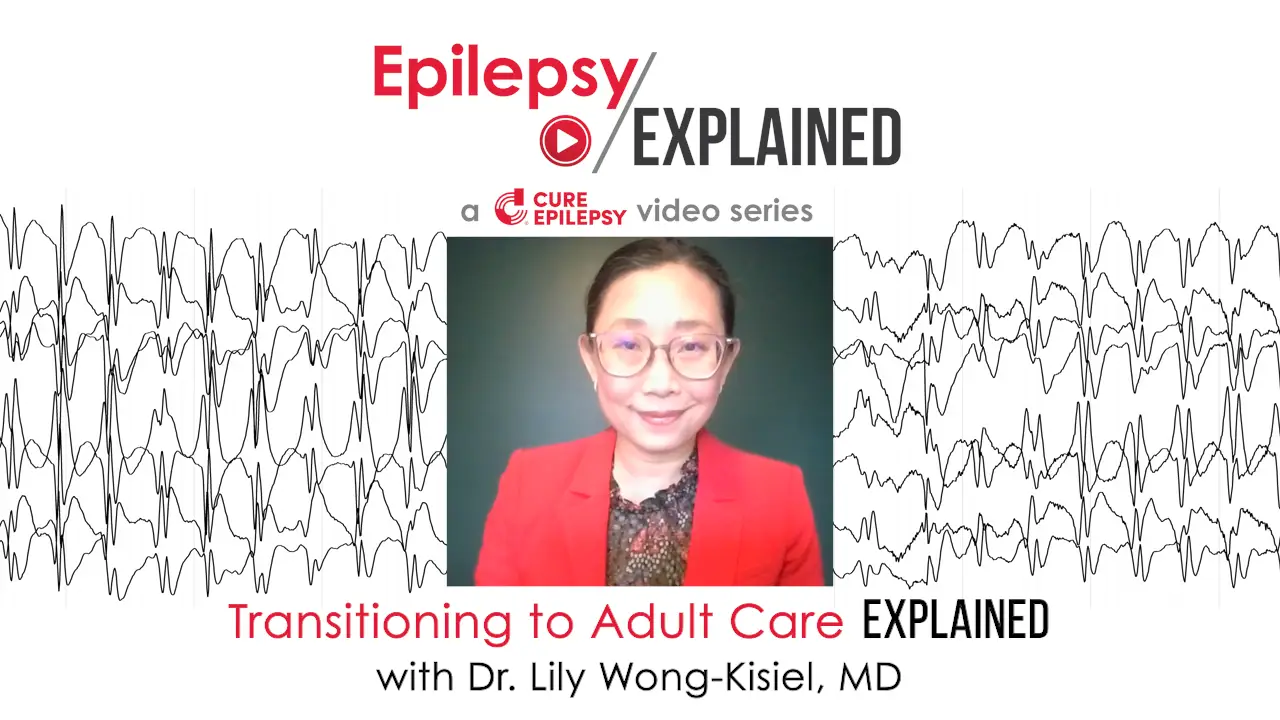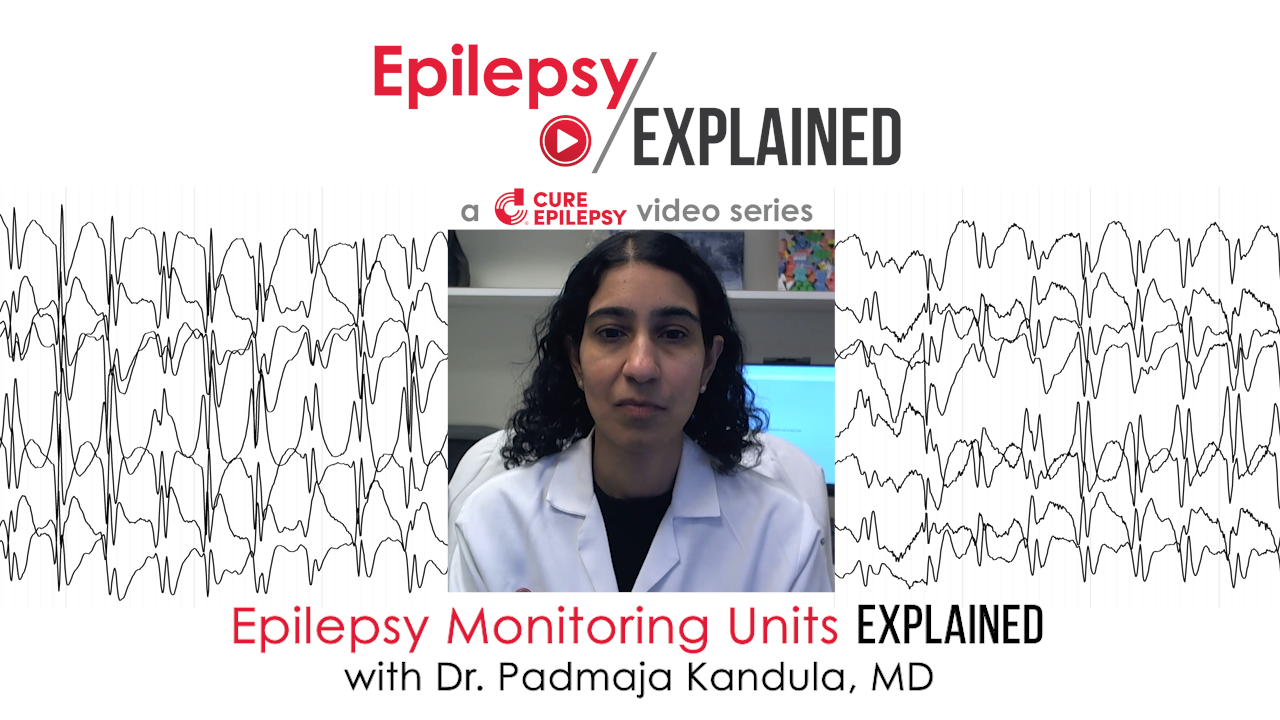In this Epilepsy Explained, Dr. Nathan Fountain, MD, Professor of Neurology and Director of the Comprehensive Epilepsy Program at the University of Virginia, answers questions about epilepsy medications.
Video Transcript
Why do I have to take medications?
Dr. Nathan Fountain: Seizure medications suppress the tendency to seizures, so to keep away seizures. People who have epilepsy have a tendency to seizures. That’s all epilepsy is, the tendency to seizures. And medications help suppress those seizures. So if you think of a seizure as an electrical storm in the brain, then the medicines keep that storm away so that people who have the underlying tendency to have seizures, hopefully won’t have the seizures. Sometimes it doesn’t quite work and the medicine dose has to be increased to suppress it that much more. And then hopefully when you get to the right level, then the seizures won’t come out.
When can I stop taking medications?
Dr. Nathan Fountain: Some people who take medications to suppress their seizures can eventually stop taking them and other people need to take them for a very long time. And that really depends on the underlying cause of your epilepsy or seizure disorder or seizures. So in some cases, the problem might actually go away, and so you could stop taking the medicines, but for a lot of people, the underlying cause persists. And as long as it persists, you have to keep taking the medication. So for example, if you think about either end of the spectrum, there are some people who have an underlying brain injury. Let’s say they had a traumatic brain injury and they have other problems in addition to seizures from that spot in the brain, that’s a problem and that lasts a long time, their whole life. For those people, they typically have a persistent underlying tendency to seizures.
So they have to take the medications because it just suppresses the seizures, doesn’t really cure the problem, just suppresses it. There’s another group of people, particularly children who might outgrow the tendency of seizures. And so for those people, they could eventually stop taking the medicines when they’ve outgrown the tendency to seizures. And that depends again on the underlying cause. There are a lot of people right in the middle whom it might not be known the cause of their seizures, and so not known if they outgrow it. And that requires a number of different assessments like EEG and considering what might be the underlying cause. So the important thing is to talk with your doctor about the underlying cause and whether or not it’s safe for you to begin to withdraw medications. But it’s really important not to stop taking them all at once just because you don’t want to take them anymore because that can cause a serious or catastrophic problem, one long seizure that doesn’t stop, or a series of seizures that might cause injury. So it’s important to talk with your doctor about whether or not you can stop taking medications.
How does a doctor decide which medication to prescribe to a patient?
Dr. Nathan Fountain: Deciding which medication to use depends on a number of things. We start with the kind of seizures. So right now, as of today, all the medicines we use are based on the kind of seizure rather than the underlying cause. So among the anti-seizure medications, they all work to suppress seizures, but they might work differently on different seizure types. Among the most common seizure types, there’s a lot of different drugs that you could choose and it depends on a number of things. We think that most of them about equally effective. So often we choose it based on other things besides how effective it is. And in particular, whether or not you have some condition that you don’t want to take this particular medicine for because it might make it worse or more often if you have another condition or problem the medicine might be used for in addition to the seizures.
So for example, some seizure medicines also treat migraine headache. So it might be good to choose a medicine that treats migraine headaches in addition to seizures. Or some people might be overweight and want to lose weight. And so there’s some medicines that cause weight loss instead of weight gain. Conversely, there’s some that tend to cause weight gain rather than weight loss. If someone has chronic pain, for instance, there are some medicines that work for that as well as seizures or some people that have other underlying conditions such as depression or anxiety that might be helped with certain medicines rather than others. Other considerations are how the medicine acts in your body and what kind of side effects it might cause. And then finally, for some people cost, because there’s no reason to take a more expensive medicine if you could take a less expensive one. And so often that means taking generic medicines before brand name, unless there’s a particular reason to take a particular brand name.
So there’s a number of different considerations in which medicine to take, and as of today, depending on how you count it, there are about 24 medicines for seizures. So we have a lot to choose from today. If we went back 20 years ago or 25 years ago, we only had three or four medicines. So we have a lot to choose from today and a lot of them are very well tolerated and very effective. So that’s a really great thing about today.
Why do medications control some people’s seizures but don’t work for other people?
Dr. Nathan Fountain: We often aren’t able to figure out why it works for one person and not another. And if you look at the big picture, the first medicine we try and some with epilepsy renders them seizure-free, meaning they’re not having seizures on the medicine about half of the time. So 50% the first medicine we try does the trick. And it’s really great for those people who do well. For about another 25%, so let’s say another quarter of them, the second medicine we try does pretty well. And so those people are doing pretty well as well. But for that last quarter of people, they might have to try several different medicines to figure out which one might actually work, even many medicines for those people or even other interventions besides medications. So unfortunately knowing why the first one didn’t work often doesn’t help, but sometimes it does. So sometimes the first medicine doesn’t work, not because it’s not working, but actually because we can’t give a high enough dose of it.
So for some people, even a low dose of the medicine gives them side effects or problems. So they can’t really tolerate high enough dose to know if the medicine really would suppress the seizures. So you have to abandon that effort on that medicine so we can try something different. So in that case, we know the reason that the medicine didn’t work, we’ve gone to another one. And that sort of doesn’t count as the first medicine try. There’s also occasional people for who the medicine doesn’t work because maybe the spells they’re having aren’t seizures. So we might have to do more evaluation that case. In that case, it might require other testing. It could even require coming to the hospital and doing EEG monitoring.
Most of the time we do know the underlying cause is seizure or that they’re having seizures and we’re confident the medicine we tried. And unfortunately when the first one doesn’t work, it’s just a matter of adding the second. And the way we do that is once someone’s on a medicine, even if we think it’s not working, we’d add the second medicine, then we see it’s tolerated in adequate dose. We’d get rid of the first medicine and continue on the second medicine. And for some people, that’s unfortunately a frustrating process, but it’s really the only way we can transition from one to another.
What kind of side effects can medications cause and why do they cause side effects?
Dr. Nathan Fountain: Side effects can be a big nuisance for seizure medicines that people take who have epilepsy or seizures. A lot of people think that because the medicine necessarily affects the brain to keep away the seizures, it’s also going to cause other problems with brain function, make them sleepy or dizzy or double vision or have problems like that. But that’s not true. For the vast majority of people with epilepsy, we can pick a medicine that suppresses the seizures, that keeps the seizures away, without causing side effects. So you definitely don’t have to live with side effects. Those kinds of problems are somewhat common though for seizure medicines like sleepiness, dizziness, fatigue, double vision. So if you have any of those, be sure to tell your doctor because you should be able to maybe lower the dose or change the medicine to make those go away. For some medicines, there’s another set of side effects that don’t have to do with the brain. So for some medicines, particularly older ones, it could affect their liver or your kidneys or your blood cells, and that might require monitoring.
The good news is that for most of the medicines we use today, those things typically aren’t a problem and typically don’t require monitoring, but sometimes they do. The other good news is that serious side effects are relatively uncommon. While nuisance side effects are relatively common, serious side effects are relatively uncommon, but you do have to be vigilant for them. The kinds of side effects that we’d think about would be serious would be a rash that affects your whole body or something that gave you other problems that you’d bring to your doctor’s attention. If you do have side effects, it’s really important not to just stop taking the medicine all of a sudden because that could precipitate serious seizures, but instead talk to your doctor right away so that they can address those side effects.
When should I talk to my doctor about trying a different medication?
Dr. Nathan Fountain: There are three really important times to talk with your doctor about trying a different medication. The first time is if you think you’re having medication side effects. Because maybe your problems aren’t due to the medication, but the only way to address that or find out is to talk with your doctor about that. They might be able to decrease the dose or change the formulation, the kind of pill you get, or it might be time to change to a different medication. The second time is if you persist in having seizures. So, our goal, meaning your goal is someone with epilepsy, and my goal as a doctor who takes care of people with epilepsy is no seizures, no side effects. And for most people with epilepsy, we can get there. It might take a long time, you might have to try several medicines, but the goal should be no seizures and no side effects.
So maybe it’s not time for that. Maybe you need to try a different formulation again or a different dose, but bring up your doctors an important time. And the third time is if your medicines are too expensive. So it might be a surprise to you to know, but your doctor has no idea how much your medicines cost because that’s determined by your insurance company or your insurance plan and the pharmacy. So we might accidentally prescribe something that’s very expensive for you that we’re entirely unaware of. So if you’re skipping doses or you’re trying to make the medicine last, be sure to bring it up with your doctor who can work with your pharmacy to hopefully reduce the cost of your medications. And finally, don’t just stop taking the medication because of those problems, particularly if it’s cost, bring it up with your doctor who can help you decide what to do about it instead of just stop. Because we don’t want you to have a catastrophic problem by stopping your medicines all at once.
When should I talk to my doctor about trying a different medication?
Dr. Nathan Fountain: Well never give up on controlling your seizures. If I could say one thing to people with epilepsy, it’s don’t give up on controlling your seizures because for I’d say most people with epilepsy, we can control their seizures and overall about half of people with epilepsy will be controlled by the first medicine they try. So for those people, they’re good for a very long time. For another 25% of people, about a quarter of people with epilepsy, we have to try other things, a second medication. And for those people, they’re doing well after those relatively minor interventions. But for about 25%, about a quarter of people with epilepsy, they need other efforts to try and control their seizures. The first thing we’d often do is additional medications. And overall, the theme needs to be to don’t give up. Besides the medications, after the first couple of medications, we’d think about devices and surgery.
So for people for whom devices and surgery aren’t appropriate, there are any number of medicines to try. And by trying one after the other over time, we hope to control their seizures. And I would do that indefinitely because every day we’re coming up with new medications, but also new devices, new kinds of surgery, new kinds of therapies and treatments that’ll hopefully help those people. On the other hand, for people who are whom a device is appropriate, after the first couple of medications, we’d think about using those devices. For people in whom we can fix or sort of cure their epilepsy, which I put in quotes because we’re never quite sure exactly what cure means, but as I think in common terminology, we’d say fix their seizures with surgery, we’d often do that after the first couple of medications. So undoubtedly after the first couple of medications, if they don’t work, that’s time to think about surgery. And there are very kinds of surgery. But the place to start is by evaluating for the possibility of surgery after the first couple of medications.
Can epilepsy be cured by medications?
Dr. Nathan Fountain: Medications don’t typically cure epilepsy in the way we’re usually talking about, and that’s because the medicines really just suppress the tendency to seizures. They don’t make a permanent change in their brain that would make the tendency seizures go away. Some people could outgrow their epilepsy and then not have to take medications. But the kind of anti-seizure medicines we’re talking about that are available today, don’t change the underlying brain in a way that would cure the epilepsy. There are other ways of curing epilepsy that are not with medications. So for instance, someone has seizures being from one spot in the brain. It’s possible to do surgery to remove that spot for some people and fix their underlying problem. There are also medications or treatments anyway that aren’t necessarily medications that are in clinical trials. So they’re in research studies that can treat specific kinds of underlying conditions.
So for example, there’s some genetic conditions that some children are born with. If you’re able to fix that genetic problem at the beginning when they’re a child, hopefully we’ll eliminate their tendency to seizures and cure their epilepsy so that they won’t have seizures. And hopefully we’ll be able to do that for everybody one day. But right now, we’re probably far from the treating or curing the typical person with epilepsy with medications or those treatments. But we hope that those research studies that are pretty far along will help at least that small group of people who have that underlying problem. But the average anti-seizure medication that we take there, the typical ones, the ones available don’t actually cure it.









